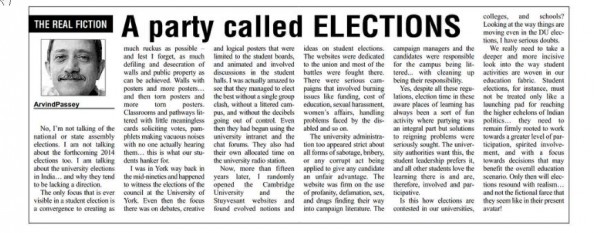No, I’m not talking of the national or state assembly elections. I am not talking about the forthcoming 2014 elections too. I am talking about the university elections in India… and why they tend to be lacking a direction.
The only focus that is ever visible in a student election is a convergence to creating as much ruckus as possible – and lest I forget, as much defiling and desecration of walls and public property as can be achieved. Walls with posters and more posters… and then torn posters and more torn posters. Classrooms and pathways littered with little meaningless cards soliciting votes, pamphlets making vacuous noises with no one actually hearing them… this is what our students hanker for.
I was in York way back in the mid-nineties and happened to witness the elections of the council at the University of York. Even then the focus there was on debates, creative and logical posters that were limited to the student boards, and animated and involved discussions in the student halls. I was actually amazed to see that they managed to elect the best without a single group clash, without a littered campus, and without the decibels going out of control. Even then they had begun using the university intranet and the chat forums. They also had their own allocated time on the university radio station.
Now, more than fifteen years later, I randomly opened the Cambridge University and the Stuyvesant websites and found evolved notions and ideas on student elections. The websites were dedicated to the union and most of the battles were fought there. There were serious campaigns that involved burning issues like funding, cost of education, sexual harassment, women’s affairs, handling problems faced by the disabled and so on.
The university administration too appeared strict about all forms of sabotage, bribery, or any corrupt act being applied to give any candidate an unfair advantage. The website was firm on the use of profanity, defamation, sex, and drugs finding their way into campaign literature. The campaign managers and the candidates were responsible for the campus being littered… with cleaning up being their responsibility.
Yes, despite all these regulations, election time in these aware places of learning has always been a sort of fun activity where partying was an integral part but solutions to reigning problems were seriously sought. The university authorities want this, the student leadership prefers it, and all other students love the learning there is and are, therefore, involved and participative.
Is this how elections are contested in our universities, colleges, and schools? Looking at the way things are moving even in the DU elections, I have serious doubts.
We really need to take a deeper and more incisive look into the way student activities are woven in our education fabric. Student elections, for instance, must not be treated only like a launching pad for reaching the higher echelons of Indian politics… they need to remain firmly rooted to work towards a greater level of participation, spirited involvement, and with a focus towards decisions that may benefit the overall education scenario. Only then will elections resound with realism… and not the fictional farce that they seem like in their present avatar!
Arvind Passey
Written on 13 September 2012
Published in ‘The Education Post’ of 17 September 2012









